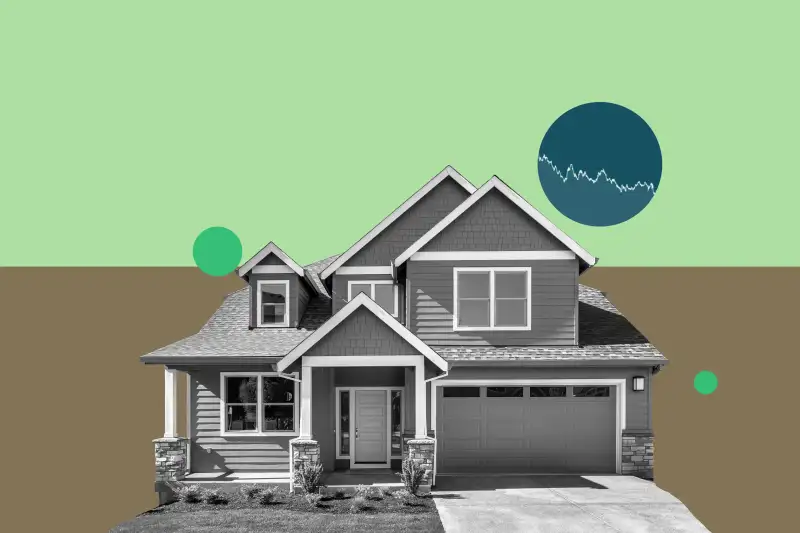Today's Best Mortgage and Refinance Rates: January 11, 2021 | Rates Higher

Home prices increased at the end of 2020 as buyers took advantage of record-low mortgage rates. Pending sales were also up, indicating that the housing market is likely to remain hot in 2021 despite economic uncertainty. Fiscal policies implemented by the new administration are expected to provide more financial support for homebuyers.
Meanwhile, mortgage rates ticked up at the end of the week.
Today's Mortgage Rates
The average interest rate on a 30-year fixed-rate mortgage was 3.102% on Friday — up from 3.098% on Thursday.
| Mortgage Rate Chart |
| Loan type | Average Rate |
| 30-Year Fixed Loan | 3.102% |
| 15-Year Fixed Loan | 2.302% |
| 30-Year FHA Loan | 2.925% |
| 30-Year VA Loan | 2.975% |
| 30-Year Jumbo Loan | 3.763% |
Source: Money | Date: Jan. 8, 2021 | Rates assume a credit score of 700
Money's daily mortgage rates show the average rate offered by over 8,000 lenders across the United States the previous day. They reflect what a typical borrower with a 700 credit score might expect to pay for a home loan right now. The rates assume a 20% down payment and include discount points.
Freddie Mac's widely quoted Primary Mortgage Market Survey put mortgage rates at 2.65% with 0.7 points paid for the week ending January 7, setting a new record low. That's 0.02 percentage points below last week. Rates set new record lows 16 times in 2020. This is the first all-time low set in 2021. The mortgage purchaser's weekly survey reflects borrowers who put 20% down on conforming loans and have excellent credit.
How do I get the best mortgage rates?
Mortgage rates vary from state-to-state. On Friday, borrowers in Illinois were quoted the lowest mortgage rates — at 3.033%. People looking for mortgages in Nevada saw the highest average rate at 3.22%.
Nationwide, borrowers with the highest credit scores, 740 and above, were quoted rates averaging 2.891%, while those with credit of 620 or below were shown rates of 4.364%.
You may be able to negotiate a better interest rate if you shop around or if you have other accounts with the lender. (To get started, take a look at Money's picks for the best mortgage lenders.) Currently, some lenders are hiking up advertised rates to keep demand in check, so you may be offered a lower rate if you reach out directly.
Today's Mortgage Refinance Rates
Money's survey also shows that the offered rate for a 30-year refinance for someone with a 740 credit score was 3.209% on Friday. In January 2020, the average mortgage rate (including fees) was around 3.8%.
| Mortgage Refinance Rate Chart |
| Loan type | Average Rate |
| 30-Year Fixed Loan | 3.209% |
| 15-Year Fixed Loan | 2.579% |
| 30-Year FHA Loan | 3.423% |
| 30-Year VA Loan | 3.449% |
| 30-Year Jumbo Loan | 3.651% |
Source: Money | Date: Jan. 8, 2021 | Rates assume a credit score of 740
What else is happening in the housing market today?
Despite a holiday season slowdown, homebuyers remained more active than usual at the end of 2020.
The median home sale price was $319,000 during the four-week period ending January 3, according to brokerage Redfin. That's a 13% increase from the same period last year. Meanwhile, Redfin found pending home sales were up 38% year-over-year, an indication that the hot housing market will likely continue into 2021 despite the economic uncertainty facing the country.
"The economy faces new challenges in the next few weeks, which are likely to see continued political instability and rising coronavirus cases,” said Redfin chief economist Daryl Fairweather. “Still, it’s unlikely that either will have a meaningful or long-term impact on homebuying demand, which, already extremely strong, is now bolstered by even lower mortgage rates."
Fairweather also noted that the migration of homeowners from the major cities to more affordable cities and suburbs around the country will more than likely reshape the government's fiscal and economic policy once the new administration takes over on January 20.
"While more government spending could lead to moderate mortgage-rate increases, it will also likely include programs to make homeownership affordable to more people," added Fairweather.
Inventory will continue to be the main stumbling block for buyers. According to Redfin, inventory was down 32% year-over-year. For the period ending January 3, 2021, there were 567,793 homes listed for sale. (For the same period in 2020, there were 835,476 homes on the market.) With the pace of new listings slowing, there are not enough homes coming to the market to keep up with demand.
Mortgage Term of the Week
Understanding the lingo can be key to avoiding mistakes when you are buying a home or refinancing your mortgage. For more read: Everything You Need to Know About Mortgage Rates in 2020.
Loan-to-Value Ratio: You can calculate your LTV by dividing your loan amount by your home's sale price or current value. (For example, if you make a 20% down payment, your starting LTV will be 80%.) Lenders use LTV to evaluate a loan's potential risk of default. The lower your LTV, the lower the risk. The lower the risk, the better interest rate you can qualify for when applying for a mortgage.
Bottom line:
9 Steps to Take Now That Will Prepare You for Buying a Home in 2021
Money's 2021 Real Estate Outlook: What to Expect for Mortgage Rates, Home Prices and More
Current Mortgage Rates: 30-Year Mortgage Rates Hit a New Low
Rates are subject to change. All information provided here is accurate as of the publish date.
